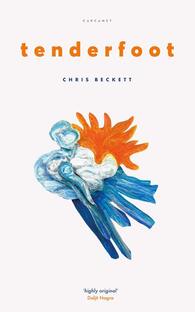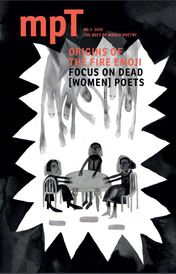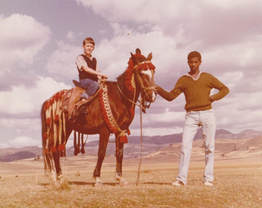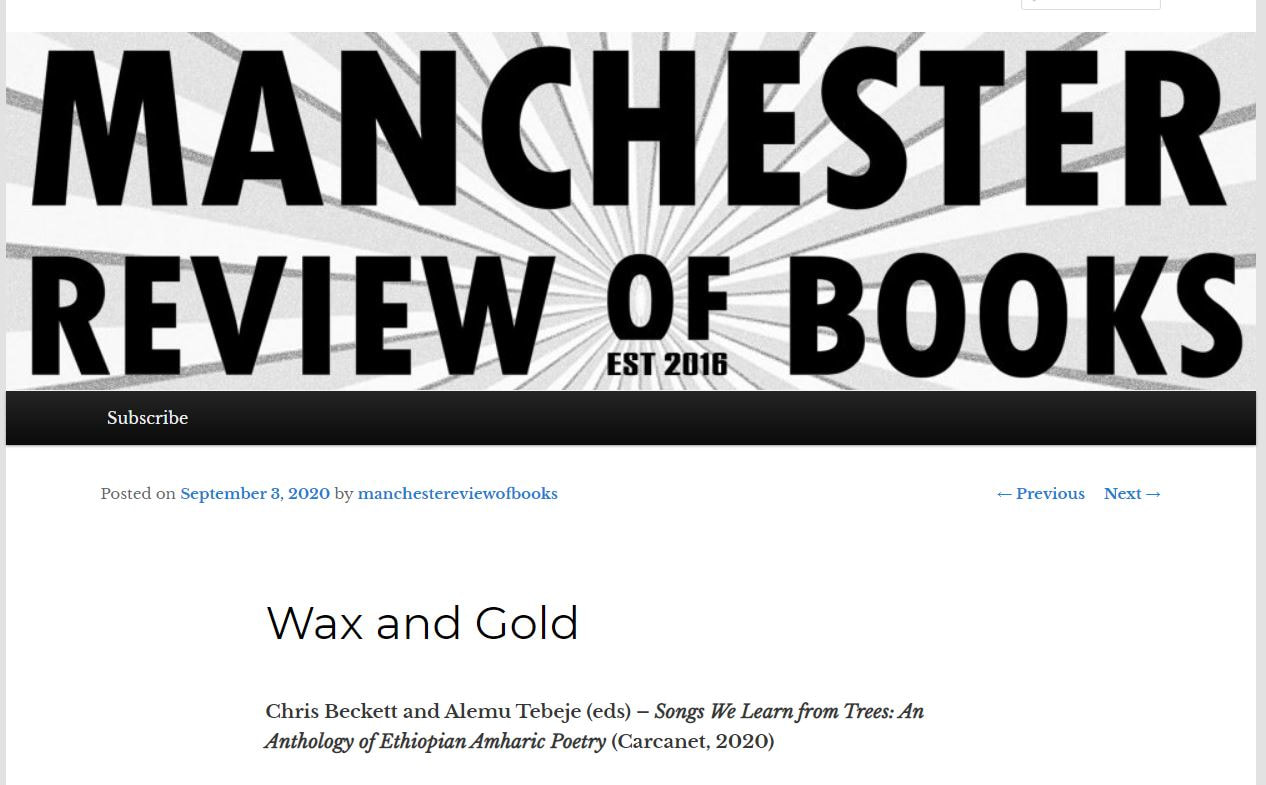
Reviews and Comments on Tenderfoot:
Anne Ryland on London Grip: Tenderfoot is a love letter to Ethiopia, where Chris Beckett spent his early childhood. The apt title, defined in an epigraph as ‘a newcomer or novice, especially a person unaccustomed to hardship’, also echoes the tenderness that suffuses this collection; it is a vibrant and passionate sequel to Beckett’s acclaimed second book, Ethiopia Boy. The opening poem, “Inglizawi negn!”, forms an intriguing threshold to 1960s Ethiopia. The pyjama-clad boy standing on the balcony of his house, already conscious of his foreignness, is mesmerized by ‘hills / already stirring with bats and the idea of pumas’ and ‘silhouettes of long-tailed birds’. Beckett writes with openness and honesty about the experience of being a white boy growing up in Ethiopia, and of returning in later years as a gay man. Read more of Anne's wonderful review here.
Sasha Dugdale: These poems are utterly distinctive, there is something at once proud and sad in them, as the reader senses that Tenderfoot loves but stands outside what he loves...
Hama Tuma: These poems bring 1960s Ethiopia vividly to life, both inside and beyond the gates of a white boy’s house, but the themes they evoke such as child hunger and inequality are also universal and pressing. Written in English, they reflect Ethiopian praise shouts, elegies, famine couplets, and the way language inevitably mirrors people’s concerns, such as hodé (my stomach) being an Amharic term of endearment (Sweetheart). You get a real sense of the poet as translator, attempting to bridge gaps of time, culture, poetry, natural justice. As Daljit Nagra writes on the blurb, Beckett ‘works with two sharply distinctive traditions in a uniquely engaging way.’ He engages us because he is fully engaged himself in bringing two languages and cultures together in his poems. (Read full review in Anglo-Ethiopian Society Newsfile Spring 2021, here. )
Caroline Maldonado: Chris Beckett’s Tenderfoot follows his two other Carcanet publications, the much praised Ethiopia Boy (2013) and Songs we Learn from Trees (2020), an anthology of Ethiopian Amharic poetry edited and translated with Alemu Tebeje. Beckett grew up in the 1960s and in the preface to his first collection tells how only after he’d started translating Amharic poems did ‘the real voice of boyhood come spilling out’. It is the physical presence of that ‘voice’ that is so enticing in both collections and the richness of imagery, leaping syntax, humour and sensuality. The first book was a collection of ‘praise shouts’ whereas Tenderfoot (a newcomer or novice, especially a person unaccustomed to hardship (OED)) is more a ‘coming of age’ collection, exploring the love of place, relationships and their contradictions of a white boy in an African country. The form of many of these poems continues to borrow from Amharic poetry, including praise shouts, and space is used inventively. Tenderfoot also approaches the unmentionable: Hunger. One poem ‘Malnourished’ provides the blunt statistics ‘one in four children, stunted/one in ten/hanging by a thread/one in twenty, dead’. The second poem is ‘for Abebe, i.m’ a beloved friend who lived and died in Ethiopia Boy. Beckett addresses him after seeing a ‘red-eyed roadside boy/furiously begging to be fed’:
‘do any of us really understand, Abebe
how finger close a boy can be
and still have nothing nothing
of the world’s good bread?’
(‘Good Bread’)
Hunger can express itself in many ways, including physical, emotional and spiritual. Another ‘unmentionable’ in many societies is still homosexuality and Beckett’s awareness of his own desires is beautifully explored in this poem:
‘What is a stone if not weeping?
and the boy
washing himself in the storm
with rough hands
and soap is he not a slim trunk of water
attracting thirsty looks from the track?’
(‘Elegy for a thunderstorm’)
And in these lovely first lines:
‘Some walk into a sunbeam
and their heads catch fire’
(‘‘When I was ten, I started watching men’)
There’s much more to be said about the imaginative, linguistic and emotional energy of Beckett’s writing than can be covered in a brief review. Enough to say here that I read Tenderfoot straight through from start to finish and was nourished by it.
(Agenda, Weatherings: Winter/Spring 2022)
Mimi Khalvati: Not only did I think your blog piece was wonderful (carcanetblog.blogspot.com/2020/07/looking-for-tenderfoot-chris-beckett.html) – but I absolutely Loved Your Book!! It’s fantastic. Really adorable. Moving, delightful, astonishing, fascinating, funny, sad – these are not just random epithets but the ones that spring to mind on thinking back. I read it last week and was so thrilled to do so. It gave me a great lift – it’s so wonderful to come across a collection that opens doors and re-inspires one and makes it all seems so worthwhile – a precious ‘commodity’ these days. Many congratulations Chris, I am so happy for you to have produced such a truly heart-warming collection.
Jane Duran: ....the poems have so much energy, each one is a flame. I’m continually surprised by your metaphors and how deep they go. Thank you for writing about hunger, I’ve never seen it brought home by a poet so starkly and truthfully. Isao’s painting Talking to the Sun is wonderful, so much movement, suggestion, human engagement with sunlight. In your poem In the Lion Gardens you say ‘I am an old man too’. Well you write like a young man, the voice and astonishment and courage and timidity of youth. What a book.
Anne Ryland on London Grip: Tenderfoot is a love letter to Ethiopia, where Chris Beckett spent his early childhood. The apt title, defined in an epigraph as ‘a newcomer or novice, especially a person unaccustomed to hardship’, also echoes the tenderness that suffuses this collection; it is a vibrant and passionate sequel to Beckett’s acclaimed second book, Ethiopia Boy. The opening poem, “Inglizawi negn!”, forms an intriguing threshold to 1960s Ethiopia. The pyjama-clad boy standing on the balcony of his house, already conscious of his foreignness, is mesmerized by ‘hills / already stirring with bats and the idea of pumas’ and ‘silhouettes of long-tailed birds’. Beckett writes with openness and honesty about the experience of being a white boy growing up in Ethiopia, and of returning in later years as a gay man. Read more of Anne's wonderful review here.
Sasha Dugdale: These poems are utterly distinctive, there is something at once proud and sad in them, as the reader senses that Tenderfoot loves but stands outside what he loves...
Hama Tuma: These poems bring 1960s Ethiopia vividly to life, both inside and beyond the gates of a white boy’s house, but the themes they evoke such as child hunger and inequality are also universal and pressing. Written in English, they reflect Ethiopian praise shouts, elegies, famine couplets, and the way language inevitably mirrors people’s concerns, such as hodé (my stomach) being an Amharic term of endearment (Sweetheart). You get a real sense of the poet as translator, attempting to bridge gaps of time, culture, poetry, natural justice. As Daljit Nagra writes on the blurb, Beckett ‘works with two sharply distinctive traditions in a uniquely engaging way.’ He engages us because he is fully engaged himself in bringing two languages and cultures together in his poems. (Read full review in Anglo-Ethiopian Society Newsfile Spring 2021, here. )
Caroline Maldonado: Chris Beckett’s Tenderfoot follows his two other Carcanet publications, the much praised Ethiopia Boy (2013) and Songs we Learn from Trees (2020), an anthology of Ethiopian Amharic poetry edited and translated with Alemu Tebeje. Beckett grew up in the 1960s and in the preface to his first collection tells how only after he’d started translating Amharic poems did ‘the real voice of boyhood come spilling out’. It is the physical presence of that ‘voice’ that is so enticing in both collections and the richness of imagery, leaping syntax, humour and sensuality. The first book was a collection of ‘praise shouts’ whereas Tenderfoot (a newcomer or novice, especially a person unaccustomed to hardship (OED)) is more a ‘coming of age’ collection, exploring the love of place, relationships and their contradictions of a white boy in an African country. The form of many of these poems continues to borrow from Amharic poetry, including praise shouts, and space is used inventively. Tenderfoot also approaches the unmentionable: Hunger. One poem ‘Malnourished’ provides the blunt statistics ‘one in four children, stunted/one in ten/hanging by a thread/one in twenty, dead’. The second poem is ‘for Abebe, i.m’ a beloved friend who lived and died in Ethiopia Boy. Beckett addresses him after seeing a ‘red-eyed roadside boy/furiously begging to be fed’:
‘do any of us really understand, Abebe
how finger close a boy can be
and still have nothing nothing
of the world’s good bread?’
(‘Good Bread’)
Hunger can express itself in many ways, including physical, emotional and spiritual. Another ‘unmentionable’ in many societies is still homosexuality and Beckett’s awareness of his own desires is beautifully explored in this poem:
‘What is a stone if not weeping?
and the boy
washing himself in the storm
with rough hands
and soap is he not a slim trunk of water
attracting thirsty looks from the track?’
(‘Elegy for a thunderstorm’)
And in these lovely first lines:
‘Some walk into a sunbeam
and their heads catch fire’
(‘‘When I was ten, I started watching men’)
There’s much more to be said about the imaginative, linguistic and emotional energy of Beckett’s writing than can be covered in a brief review. Enough to say here that I read Tenderfoot straight through from start to finish and was nourished by it.
(Agenda, Weatherings: Winter/Spring 2022)
Mimi Khalvati: Not only did I think your blog piece was wonderful (carcanetblog.blogspot.com/2020/07/looking-for-tenderfoot-chris-beckett.html) – but I absolutely Loved Your Book!! It’s fantastic. Really adorable. Moving, delightful, astonishing, fascinating, funny, sad – these are not just random epithets but the ones that spring to mind on thinking back. I read it last week and was so thrilled to do so. It gave me a great lift – it’s so wonderful to come across a collection that opens doors and re-inspires one and makes it all seems so worthwhile – a precious ‘commodity’ these days. Many congratulations Chris, I am so happy for you to have produced such a truly heart-warming collection.
Jane Duran: ....the poems have so much energy, each one is a flame. I’m continually surprised by your metaphors and how deep they go. Thank you for writing about hunger, I’ve never seen it brought home by a poet so starkly and truthfully. Isao’s painting Talking to the Sun is wonderful, so much movement, suggestion, human engagement with sunlight. In your poem In the Lion Gardens you say ‘I am an old man too’. Well you write like a young man, the voice and astonishment and courage and timidity of youth. What a book.
Reviews of Songs We Learn from Trees:
|
MANCHESTER REVIEW OF BOOKS: please read Joe Darlington's wonderfully sympathetic, positive and encouraging review of Songs! Joe's piece is full of excerpts from the poems, thoughtful comments on the poetics and background of Ethiopian writers. It is a really attentive and engaged piece of criticism and I thank him for it greatly!
Just click on the pic... |

The first review of SONGS WE LEARN FROM TREES is in the latest issue of MPT:
"Songs We Learn From Trees: An Anthology of Ethiopian Amharic Poetry, edited and translated by Chris Beckett and Alemu Tebeje, Carcanet, 2020
Chris Beckett and Alemu Tebeje’s anthology of Ethiopian Amharic poetry is wonderful – not only for the choice of poems – but for the fluency and energy of the translations. The editors are also to be congratulated for their cogent introduction and context to Ethiopian poetry...."
To read on, please clic on the pic

From reviews of Ethiopia Boy:
Ian McMillan on The Verb, Radio 3 : Chris Beckett is a poet whose childhood in 1960s Ethiopia has been the inspiration for a remarkable body of work collected in his book Ethiopia Boy. In it, you find praise poems, imitations of laments, boasts, a dirge, and visual and linguistic representations of varieties of sticks. In their willingness to cross languages and cultures and expectations of what a poem can be, I've not read anything like them before. (BBC Radio 3, 5th April 2013)
Daljit Nagra: Chris Beckett’s poetry is highly original in the way it simultaneously works with two sharply distinctive traditions in a uniquely engaging style.
Fred D’Aguiar: There is a drive to these poems, a quality of song, a fresh simplicity that neatly sidesteps sentimentality though replete with longing, a feel for the past.
Julian Stannard (Poetry Review, Autumn 2013): Ethiopia Boy by Chris Beckett is a delight. For a moment I thought of Orlando, that mischievous, nevertheless generous, love letter by Virginia Woolf for Vita Sackville-West. Like Orlando, Beckett’s collection travels through time as we are given dazzling vignettes which, without any pedagogic insistence, teach us through poetry about a country which has too often been mired in journalistic accounts of political catastrophe and terrible famine. ...Ethiopia Boy is, in fact, a love letter. The nostalgia for for Haile Selassie’s “glamorous barefoot empire, home of black-maned lions and [...] blazing young singers of Ethio-Jazz”, ...is reinforced by the poet’s continuing engagement with, and translation of, Ethiopian poetry. It is a love letter to Abebe, the cook’s son (the object of the English boy’s affections), and the opening piece – an extended apostrophe, a type of litany, unabashed – is emblematic....
Karen McCarthy Woolf (Poetry London, Autumn 2013): Beckett wrote poetry as a teenager, but it wasn't until he began to translate Amharic verse that he felt able to capture the spirit of the rich oral culture that surrounded him as a boy. The result is a warm and affectionate depiction of a country, a culture and its people in a book that evokes a keenly felt nostalgia in its best, and original, sense of the word....
Helena Nelson: These poems are not translations; they were conceived and written in English. But they have the feeling of translation - their success at capturing another country infects the language, form and phrasing. It works, it really does.
(Read the rest of Helena's review at: www.carcanet.co.uk/cgi-bin/scribe)
Mark Sanderson: The best recent poetry, 24 February 2013 (The Telegraph online):
Chris Beckett relives his exotic Sixties childhood in Ethiopia Boy (Carcanet, £9.95). Colourful incantations evoke the sights and sounds and above all the food of the East African nation: “Staring eggs, long stick- / tooth shreds of goat, gooey / angel peas and half-bean kikwot” (“Wot?”). Wot, a stew, makes up part of the national dish.
Steven Waling (Elsewhere, A Review of Contemporary Poetry, 26 Feb 2014): "A different sound world": It’s not often that one reads a book of poetry which brings a different music into English poetry; but Ethiopia Boy does just that. The African praise poem is not much appreciated in England; but Chris Beckett, who spent his formative years in Ethiopia, has managed to make use of it in a very supple, subtle way to talk of his childhood and the country he knew then.
Full review: oftime2.wordpress.com/2014/02/26/a-different-sound-world/
Beth McDonough (University of Dundee arts website DURA): .....typography is showcased wonderfully in the expansive shape poem “Sticks” – the most ordinary of subject-matter made extraordinary. There are so many poetic forms and devices in this collection: list poems and laments, curses and praises, descriptive verse and some very funny poetry indeed.
(Read the full review at: dura-dundee.org.uk/ethiopia-boy/)
Hama Tuma in The Anglo-Ethiopian Society News File, summer 2013: Chris Beckett...grew up in the Ethiopia of the 1960s when I and many others were making our way into the university and to protest and rebel against Emperor Haile Selassie’s rule. Ethiopia was then, as it is today, a land of contradictions, of sumptuous feasts...and as Beckett notes in his poem The banquet, where “daytime beggars show us sores and stumps/ stick hungry babies under our noses”, a land of famine and injustice, of oppressed people stubbornly clinging to their pride and tattered clothes. Beckett has captured the spirit and soul of the land, the fatalism (“I am bad days coming and days that are worse than that”, To the man with a guzzler wife), and, yes, the romanticism and hope eternal of the ordinary Ethiopian....Langston Hughes lamented in his Afro-American Fragment: “So long, so far away, is Africa”. For Beckett, Ethiopia is here and now, in his memory, alive in his versatile poems, not far away and distant but near and vibrant.
*****
From Londongrip's review of In Search of Fat: The Poetry Parnassus gathering at London’s South Bank achieved a notable success at its very first event – a lunchtime reading on the QEH roof garden – by introducing the Ethiopian poet Bewketu Seyoum. Along with his co-translator, the British poet Chris Beckett, he performed a remarkable set of poems, mainly chosen from his first English chapbook In Search of Fat....This chapbook is itself like a small glinting piece of gold and Flipped Eye are to be congratulated on producing it. Bewketu Seyoum is well known as both a poet and a novelist in his own country; but until now his appearances in English-language publications have been limited to magazines. It is to be hoped that In Search of Fat will prove to be the first of many British book publications.
*****
Ian McMillan on The Verb, Radio 3 : Chris Beckett is a poet whose childhood in 1960s Ethiopia has been the inspiration for a remarkable body of work collected in his book Ethiopia Boy. In it, you find praise poems, imitations of laments, boasts, a dirge, and visual and linguistic representations of varieties of sticks. In their willingness to cross languages and cultures and expectations of what a poem can be, I've not read anything like them before. (BBC Radio 3, 5th April 2013)
Daljit Nagra: Chris Beckett’s poetry is highly original in the way it simultaneously works with two sharply distinctive traditions in a uniquely engaging style.
Fred D’Aguiar: There is a drive to these poems, a quality of song, a fresh simplicity that neatly sidesteps sentimentality though replete with longing, a feel for the past.
Julian Stannard (Poetry Review, Autumn 2013): Ethiopia Boy by Chris Beckett is a delight. For a moment I thought of Orlando, that mischievous, nevertheless generous, love letter by Virginia Woolf for Vita Sackville-West. Like Orlando, Beckett’s collection travels through time as we are given dazzling vignettes which, without any pedagogic insistence, teach us through poetry about a country which has too often been mired in journalistic accounts of political catastrophe and terrible famine. ...Ethiopia Boy is, in fact, a love letter. The nostalgia for for Haile Selassie’s “glamorous barefoot empire, home of black-maned lions and [...] blazing young singers of Ethio-Jazz”, ...is reinforced by the poet’s continuing engagement with, and translation of, Ethiopian poetry. It is a love letter to Abebe, the cook’s son (the object of the English boy’s affections), and the opening piece – an extended apostrophe, a type of litany, unabashed – is emblematic....
Karen McCarthy Woolf (Poetry London, Autumn 2013): Beckett wrote poetry as a teenager, but it wasn't until he began to translate Amharic verse that he felt able to capture the spirit of the rich oral culture that surrounded him as a boy. The result is a warm and affectionate depiction of a country, a culture and its people in a book that evokes a keenly felt nostalgia in its best, and original, sense of the word....
Helena Nelson: These poems are not translations; they were conceived and written in English. But they have the feeling of translation - their success at capturing another country infects the language, form and phrasing. It works, it really does.
(Read the rest of Helena's review at: www.carcanet.co.uk/cgi-bin/scribe)
Mark Sanderson: The best recent poetry, 24 February 2013 (The Telegraph online):
Chris Beckett relives his exotic Sixties childhood in Ethiopia Boy (Carcanet, £9.95). Colourful incantations evoke the sights and sounds and above all the food of the East African nation: “Staring eggs, long stick- / tooth shreds of goat, gooey / angel peas and half-bean kikwot” (“Wot?”). Wot, a stew, makes up part of the national dish.
Steven Waling (Elsewhere, A Review of Contemporary Poetry, 26 Feb 2014): "A different sound world": It’s not often that one reads a book of poetry which brings a different music into English poetry; but Ethiopia Boy does just that. The African praise poem is not much appreciated in England; but Chris Beckett, who spent his formative years in Ethiopia, has managed to make use of it in a very supple, subtle way to talk of his childhood and the country he knew then.
Full review: oftime2.wordpress.com/2014/02/26/a-different-sound-world/
Beth McDonough (University of Dundee arts website DURA): .....typography is showcased wonderfully in the expansive shape poem “Sticks” – the most ordinary of subject-matter made extraordinary. There are so many poetic forms and devices in this collection: list poems and laments, curses and praises, descriptive verse and some very funny poetry indeed.
(Read the full review at: dura-dundee.org.uk/ethiopia-boy/)
Hama Tuma in The Anglo-Ethiopian Society News File, summer 2013: Chris Beckett...grew up in the Ethiopia of the 1960s when I and many others were making our way into the university and to protest and rebel against Emperor Haile Selassie’s rule. Ethiopia was then, as it is today, a land of contradictions, of sumptuous feasts...and as Beckett notes in his poem The banquet, where “daytime beggars show us sores and stumps/ stick hungry babies under our noses”, a land of famine and injustice, of oppressed people stubbornly clinging to their pride and tattered clothes. Beckett has captured the spirit and soul of the land, the fatalism (“I am bad days coming and days that are worse than that”, To the man with a guzzler wife), and, yes, the romanticism and hope eternal of the ordinary Ethiopian....Langston Hughes lamented in his Afro-American Fragment: “So long, so far away, is Africa”. For Beckett, Ethiopia is here and now, in his memory, alive in his versatile poems, not far away and distant but near and vibrant.
*****
From Londongrip's review of In Search of Fat: The Poetry Parnassus gathering at London’s South Bank achieved a notable success at its very first event – a lunchtime reading on the QEH roof garden – by introducing the Ethiopian poet Bewketu Seyoum. Along with his co-translator, the British poet Chris Beckett, he performed a remarkable set of poems, mainly chosen from his first English chapbook In Search of Fat....This chapbook is itself like a small glinting piece of gold and Flipped Eye are to be congratulated on producing it. Bewketu Seyoum is well known as both a poet and a novelist in his own country; but until now his appearances in English-language publications have been limited to magazines. It is to be hoped that In Search of Fat will prove to be the first of many British book publications.
*****
